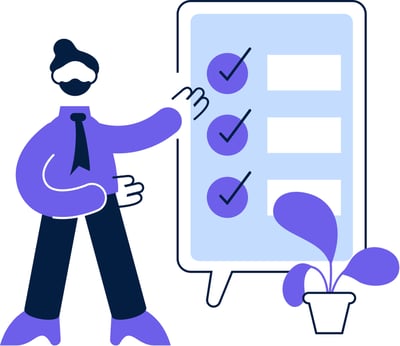How to Handle Upset Scholarship Applicants - 5 Masterful Tips
Some scholarship applicants will inevitably be unhappy and upset, especially if they aren’t selected as a recipient. After all, the process of applying for scholarships is often long and arduous. Scholarship committees must review countless applications and make difficult decisions about who will receive funding. As a result, some applicants may feel disappointed or even angry when the scholarship review process is complete.
However, there are ways to handle upset scholarship applicants effectively. Scholarship program managers should be trained on how to handle the most common complaints, and ensure that upset scholarship applicants are less likely to go unheard.
With a bit of understanding and the right resources, you can help an unhappy applicant come around without things escalating out of control. With that in mind, below we’re sharing five tips for handling upset applicants.
1. Read (Or Listen to) The Complaint In Full Before Responding
When scholarship applicants are upset, it's natural for them to expect that you'll be able to fix their problem immediately. Because of this, some will make demands without explaining what the actual complaint is.
If necessary, ask scholarship applicants to explain their issues more clearly and/or provide additional information. The more insight you have into what caused the problem with a scholarship applicant, the better equipped you'll be to resolve it quickly and effectively.

A simple question might be all it takes to resolve an issue. This means you don't have to guess or make assumptions, and it will help you avoid wasting time with incorrect responses.
If you're not currently reading and truly understanding your complaints, you could be missing out on significant opportunities to improve your scholarship program. For example, if you’re hearing from candidates that the essay questions are too complicated, or that the number of letters of recommendation is too high, you may be able to change your form for the next round to make things easier on your pool of applicants.
2. Acknowledge The Upset Applicant's Feelings
Everyone gets upset and has moments where they feel like the world is against them. If an applicant's complaint seems to stem from a place of anger, it can be helpful to acknowledge their feelings.
When you respond to an upset scholarship applicant with empathy, you're showing that their feelings are valid and important to you. You will often be able to address their concern more effectively after you've validated their feelings, which makes it easier for them to feel like they are being heard.
You can use phrases like "I understand why you would feel that way" or "I know how frustrating this must have been for you." These will help the scholarship applicant feel that you are genuinely listening, which will give them confidence in your ability to handle their problem.
3. Validate The Complaint
It can be challenging for someone who has been upset for a while to begin thinking clearly again. If an applicant feels like you're not taking their concerns seriously, they will be less likely to want to work with you in the future. That's why it's essential to validate their complaints and feelings before you offer solutions. And if the complaint is not valid, you need to be able to explain why it is invalid.
 It will help if you put yourself in the applicant's shoes to understand why they feel a certain way. Once you have determined that you have a genuine understanding of their complaint, you can begin to address it with helpful solutions.
It will help if you put yourself in the applicant's shoes to understand why they feel a certain way. Once you have determined that you have a genuine understanding of their complaint, you can begin to address it with helpful solutions.
4. Make Necessary Changes To Improve
Once you've heard their complaint and validated it, you can begin proposing solutions for the future. Remember that one upset applicant may only represent a small percentage of your pool. You shouldn't worry too much about an upset applicant's request if it would be challenging to implement.
If you choose to make changes due to an upset applicant's complaint, it's best to communicate that with them. Let them know that you've heard their concerns and that you've taken steps to improve them in the future. You can also ask them for input or suggestions that could help you handle similar complaints in the future.
Having focus groups and in-person interviews can help you identify things that upset applicants may not be proactive about voicing. These can include nuances in their complaints that you may not have noticed on your own.
Take time to reflect on what upset scholarship applicants have been saying and if necessary, adjust your scholarship program accordingly.
5. Professionally Communicate The Reason For Rejection
Most scholarship programs only have one, a couple or perhaps just a handful of scholarships to award. That means that many applicants aren't selected for a scholarship, which can understandably make them upset.
Some applicants may even be relying on your scholarship program to help them totally pay for school, which means they will be even more frustrated and potentially difficult to console if denied. In these types of situations, you need to communicate professionally even when emotions are running high. Explain why their application was not chosen in an informative, yet kind way. In other words, make sure the rejection doesn’t feel personal.

You can use phrases like "Unfortunately, we declined your application for (insert reason here). We do hope that you'll continue to apply again in the future." This gives applicants closure while also showing them what they could do better to improve their chances of receiving a scholarship next time around.
Give applicants feedback to know what to do better in the future. It is also a good idea to offer positive affirmations and words of encouragement to help applicants feel good about their accomplishments and hopeful for the future.
Final Thoughts
Upset scholarship applicants can be an issue no matter how carefully you screen applications. What matters most is that you know how to handle them professionally, sympathetically, and effectively. While you can't change an upset applicant's feelings, you can listen to what they're saying and offer solutions for the future. After every application period, take some time to reflect on what upset scholarship applicants have been saying.
Communication is critical when it comes to presenting solutions and next steps to rejected applicants. Be honest, but also kind and understanding. Offering helpful feedback and compassionate communication can help you increase your applicant pool in the future!
Managing the application process can be a daunting task. Using software like SmarterSelect can make it a lot easier. You can review applications in one place rather than going through them individually. This helps you quickly identify who to invite for an interview and communicate with applicants if something needs to be addressed after the application period is over.
Ready to learn more? Try SmarterSelect out for yourself today! Get a free trial now!
FAQs
1. How can I best handle upset scholarship applicants?
Here are five top tips you can use to handle upset scholarship applicants in the best possible manner:
- Read (or listen to) the complaint in full before answering.
- Acknowledge the upset applicant’s feelings.
- Validate the complaint.
- Make necessary changes to improve.
- Professionally communicate the reason for rejection.
2. How can I give upset applicants the confidence that I can handle their problem?
To give confidence to the upset applicants that you can handle their problem, you need to first acknowledge their feelings by using phrases like "I understand why you would feel that way" or "I know how frustrating this must have been for you." These will help the scholarship applicant feel that you are genuinely listening, which will give them confidence in your ability to handle their problem.
3. How can I best communicate the reason for rejection professionally?
In order to communicate the reason for rejection professionally, you need to tell them why their application was not chosen in an informative, yet kind way. Make sure the rejection doesn’t feel personal. Use phrases like "Unfortunately, we declined your application for (insert reason here). We do hope that you'll continue to apply again in the future." This gives applicants closure while also showing them what they could do better to improve their chances of receiving a scholarship next time around.



